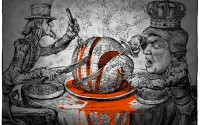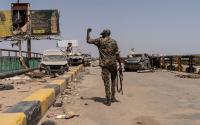20 October 2005Asia Times
Occupied Iraq has virtually no security, electricity, water or jobs. Last Saturday, instead of basic necessities for a decent life, Iraqis had a referendum - already suspected of massive fraud - on a constitution few have even seen. Starting on Wednesday, Iraqis, and the rest of the world for that matter, get a running soap opera - the trial of Saddam Hussein, under whose regime, for all its terror, and then 12 years of economic sanctions, Iraqis at least had security, electricity, water and jobs.
This "trial of the century" - or at least the early 21st century - starts at a secret Green Zone location, by an anonymous court, and under extreme, US military-imposed security measures. It's a made in USA affair - in administrative and financial terms. The court, the training and the whole proceedings cost US$75 million - courtesy of US taxpayers (the budget was allocated in May 2004). About 300 people - paid by the Americans - work on the trial machinery. The five "secret" Iraqi judges - Shi'ites and Kurds, no Sunnis - are paid by the Americans, live inside the Green Zone and are protected by the Americans from being kidnapped or killed. They have received special training from US, British and Australian legal experts and have even staged a mock trial in London. They are supposed to be "independent" in a country on which "the United States continues to wield vast influence", according to the understated Associated Press. Human Rights Watch has warned on the record that the trial may be "violating international standards for fair trials". The initial charges against Saddam will focus on the killing of 143 Shi'ites in the village of Dujail, north of Baghdad, in 1982, after an assassination attempt against him. Recently disclosed images from Iraqi TV at the time show Saddam touring Dujail in triumph - but not the hostility of the crowd. The assassination attempt was claimed by the Shi'ite Da'wa Party. Current Prime Minister Ibrahim Jaafari happens to be a leader of the Da'wa Party. As far as he's concerned, Saddam should be pronounced guilty in no time. "We are not trying to land on the moon here ... It's enough [to try Saddam] on Dujail and Anfal. The tribunal is just and open, he has a defense lawyer and the verdict will match the crime ... I don't want to intervene in judicial proceedings, but why do we say now that more time is needed?" Six other people are being tried alongside Saddam. They include his half-brother Barzan al-Tikriti - who was the head of the terror-inflicting Mukhabarat intelligence services; his notorious henchman Taha Yassin Ramadan; Awad Hamed al-Bander, the judge who sentenced many in Dujail to death; and four Ba'ath Party officials. The prosecution charges that Saddam himself, as head of state, certified the executions pronounced by an Iraqi special tribunal presided by Bander. This won't be an American-style courtroom drama. There's no jury. The chief judge will question a number of witnesses. Many have already been interviewed before the trial. The five judges decide whether Saddam and his six co-defendants are innocent or guilty. Saddam will have the right to call witnesses. If he is convicted, his defense team will be able to file a number of appeals before the sentence - expected to be death - is applied. If it's death row, Saddam must be executed - in fact hanged - within 30 days of the ruling on his last appeal. The description of the trial procedures is provided, once again, not by Iraqis, but by Americans - at the National Security Council and the State Department. This special Iraqi tribunal was instituted by former American proconsul L Paul Bremer in December 2003 - curiously only three days before Saddam, according to the official Pentagon version, was captured in his hole on the ground. The tribunal is supposed to judge crimes committed by Iraqis - inside and outside the country - between July 17, 1968 (when the Ba'ath Party took power) and May 1, 2003, as well as war crimes perpetrated during the Iran-Iraq War (1980-1988) and the invasion of Kuwait (1990-1991). So a string of trials may be in the offing - concerning, for starters, the Anfal campaign of 1987-1988 which killed at least 5,000 Kurds, the invasion of Kuwait in 1990, the suppression of the Shi'ite uprising of 1991 (which may have killed 200,000 people) and the widespread assassination of Shi'ite religious leaders, like the Grand Ayatollah Baqr al-Sadr. The legal daughter from hellSaddam's defense, for the moment, is a total mess. The Iraqi lawyer in charge is Baghdad-based Khalil al-Dulaimi, who has met Saddam only six times. But it is Raghad, Saddam's oldest daughter, who is really in charge of everything - an authority conferred by Saddam's wife and his two other daughters. Two months ago, Raghad fired almost the entire defense team, except for Dulaimi. Several Iraqi lawyers have volunteered to help him. The prosecution had two years to review the case, Dulaimi says he was given only two weeks. In spite of the alleged $15 billion or more that Saddam would have stashed (there was never any proof), there's no money for his defense, according to Ziad al-Khasawneh, a Jordanian lawyer who resigned three months ago because he could not stand Raghad. He charges that Raghad is in fact supported - generously - by the royal families of Jordan and Qatar, buying loads of designer gear and jewelry in Amman, always paid for in hard cash carried in a leather briefcase by a male bodyguard. Raghad was married to Hussein Kamel (they have three children), the man responsible for Iraq's fabled weapons of mass destruction program who defected to Amman in 1995 and then told three UN senior executives that the program had been dismantled (thus eliminating, eight years in advance, the official Bush administration reason for invading Iraq). Kamel was lured back to Iraq six months later, under the belief he would be forgiven, only to be executed under the orders of - who else - Saddam himself. One of Saddam's foreign defense lawyers is Franco-Lebanese Andre Chami. He charges that at the moment "we have a parody of trial and a parody of defense". Chami says only himself and Dulaimi have been properly authorized so far to defend Saddam. But Dulaimi, according to Chami, is inexperienced, "has no strategy" and has never even practiced as a penal lawyer. Chami never met Saddam. But he met Raghad three times, in Amman and in Libya. Chami has read the 800-page Dujail dossier. He says, "It's totally empty. In France, any judge would dismiss the case, it would not even go to trial." The prosecution, he says, has just used the original Iraqi special tribunal dossier about the assassination attempt against Saddam, and turned it upside down. "This is a political trial," he charges. Raghad has approached Anthony Scrivener, a former chairman of the Bar Council of Britain, to head the defense team's challenge of the legitimacy of the tribunal. In 2004, Scrivener published an article in London's Independent on Sunday saying, "The trial of Saddam Hussein and some of his nasty colleagues has already degenerated into the realms of a promising theatrical farce." Saddam's defense team insists - and will continue to insist - that the trial has no jurisdiction because it has been created by an occupying power which has no right to change the legal system of an occupied country. Abdel Haq Alani, an Iraqi lawyer based in Britain and at least for the moment the chief defense strategist, has already hinted that the defense strategy will be to delay everything all the time; to insist that this court is illegal under international law; and to insist that Saddam has sovereign immunity from prosecution because everything he did was legal under the previous Iraqi constitution. As far as Dujail is concerned, the defense will argue that the 143 people who were executed had been found guilty under Iraq's laws and Saddam's only role was to sign their death warrants - just as George W Bush, as governor of Texas, sent 152 people to death. From tyrant to martyr? Harold Pinter, the new Nobel Prize of Literature winner, has described the American invasion of Iraq as "a bandit act, an act of blatant state terrorism, demonstrating absolute contempt for the concept of International Law". The world will be watching whether international law will be respected during Saddam's trial. The first few images - hopefully unedited - will be crucial. If they convey the impression of an occupiers' trial, the game is over. It means no credibility vis-a-vis the Iraqi population, the predominantly Sunni Arab world, and the world at large. This trial - the first test - is based on a concrete fact. But the defense has a point as it contests the legitimacy of the tribunal itself. Thus the danger: Saddam the tyrant has a golden opportunity to (re)present himself to the Sunni Arab popular masses as Saddam, martyr of the American empire.






